An even keel is not the only way
in defence of feeling joyful
I interrupt this week’s writing of an essay about testing our connections with each other (that I promised
I would write about a year ago), to talk about an unfashionable but urgent topic: joy.1There is a pervasive contemporary opinion that feeling or expressing joy somehow makes you a ‘less serious person’. This is patently nonsense, akin to dismissing someone’s ideas because of their accent or dialect, which still happens widely in my country, (especially with people from the Midlands or the West Country being seen as coming across as somehow less intelligent). As a large, widely distributed species, much of humans’ strength and adaptability comes from the huge variety of ways we have historically moved about, communicated, procured food, or organised ourselves into groups. The almost infinite variation in local customs should be proof enough that there is no one right way to be a human and I personally advocate for the view that we will need all the myriad ways over the coming difficult times.
I have probably been the most critical person of my own joy over the years, perhaps I internalised the occasional scathing glances I experienced in the London art world of the 90s, or the scowls and sharp intakes of breath from classmates when my enthusiasm for the Periodic Table of Elements or colour theory bubbled over. Perhaps nowadays I would have had a ‘neuro-divergent’ label applied to me, and I could have had a leg to stand on, rather than have girls attempt to bully me into conformity.2 I have toned myself down innumerable times and compared myself negatively to my more quiet and seemingly even-keeled friends and partners. I want to write a little here about the genuine pitfalls of occasional over-abundance of joyful feeling, but no longer will I describe it as a lesser, more childish or less appropriate way to walk the path. However, for family, friends, bandmates, exes or students who may be reading this, I am aware that it’s absolutely your right to have found me ‘too much’ sometimes. I hope I am better at reading the cues more now… Unlike this fellow.
The robbers return
In the Taoist Classics, several things are listed as robbers of our energy, such as over-eating, over-drinking, too much or too little sleep, excessive discursive thinking, worrying, despair, and interestingly, over-indulgence in joy. For about 20 years I have been pondering my innate propensity for what I usually call over-bumptiousness, or over-joy, and how I can tally that with a meditative practice that prioritises calm evenness and non-indulgence of extremes of feeling.
Firstly, it’s pretty clear to me that T’ai Chi has certainly evened out my and my students’ moods, settled our hearts and made us far more anti-fragile, therefore less prone to the slings and arrows of outrageous fortune. However, on Friday night I returned from 5 day’s teaching natural art materials at Schumacher College, where it was abundantly clear that ebullient expressions of joy and delight were exactly what were needed, both amongst the students on my course and in the wider college in general, which is going through a profound period of change.3 Thanks to a unique combination of souls, incidentally all women this time, by Wednesday, it felt like a rolling boil had been achieved, with permission granted to bounce, giggle, mix three earth paints in a row until midnight, and to spontaneously make a chorus of sounds4 each time a new bright earth was presented or ink turned suddenly black with the addition of iron.
The Sisterhood of the Smashing Galls instantly formed as the group took turns in bright sunlight to pulverise the oak galls we needed to make ink. Now, taking a log in hand and bashing a bag of galls is fun, even on one’s own, but I have never watched delight spread so quickly and differently between people. I did not know there were so many unique ways or rhythms of hitting a bag with a stick.
My T’ai Chi teacher sometimes talks to his senior students about how some of our practices give permission to exiled or banished parts of ourselves to return. This can often be long and unsettling work, even though it yields excellent results, as we gently work through it in our physical practice. But this week something else was afoot, as Ava Osbiston so beautifully put it when she came to talk as our guest artist; we were the banks of the river and something was flowing through us, we didn’t have to make the flow happen.
Anhedonia
A few weeks ago I was being tested in a series of loudly clanking state-of-the-art scanning machines for the cause of some pretty cataclysmic headaches, two of which almost saw me off, as I was deep in seawater, swimming at the time. Thankfully friends saw my demeanour change and brought me safely to shore. The headaches seem to have eased off given plenty of good food, osteopathy and T’ai Chi, and equally fortuitously, I now have proof that I have a brain in my skull, which was a relief… Being a body, especially as a menopausal woman, is an occasionally humbling and often foolish-feeling experience. This month I am using it to temper myself for the years before death (if I am granted such a time) where indignity and reduced agency may be part of the ordinary conditions of my life.
Six years ago I suffered similarly, while excoriating hormones ran riot through my otherwise orderly and literally ship-shape life aboard a tiny boat on the River Thames. This had been preceded by one and a half years without joy: anhedonia. I even drew a graph.
As I drew it, I began to realise the predicament I was in. I had not known how attached I had been to the peaks of delight and good mood that were part of my everyday life since I had returned to serious T’ai Chi study in about 2002. The Classics were right, I thought, perhaps this was the payback of over-indulgence in pleasurable states, something the many excellent Buddhist teachings I had read over the years also warned against. Over-delight caused a strange pain and exhausted feeling in my kidneys, well-known in TCM as a result of straining too hard at life. What Ursula LeGuin notes in a description of a play within her masterful book Always Coming Home as ‘Turning the wheel too fast’.
It is probable that sometimes my attachment to feeling great had been like binge-drinking, rather than like an occasional lovely glass of wine shared at a meal with friends. In the literature and revered books of both my familiar ‘home’ traditions (Taoism and Christianity), wine and intoxicating substances are not banned, as they are in some other faiths and paths. They are to be approached with care and respect, rather than indulged in to excess. In the Mountains and Rivers poetry and paintings of Chinese Chan (Zen) and Tao, both rice wine and ‘the smoke of the green mountain buds for the one who lives alone’ are woven into stories of spiritual friendship and immersion in nature. In the New Testament, one of the most famous stories about Jesus is how he turned water into wine at the wedding in Cana. Last week a friend spoke movingly about how he was sure that this would have been very fine wine indeed, none of your cheap stuff, but something to savour and bring joy to the whole wedding party.
When, in November 2017, I went to the mountains of Romania and asked an old spruce tree how on Earth I could, with even a little grace, get through the great change that was ahead for me; losing youth, seemingly sometimes losing my mind, I was given two choices.5 There was a slow, gentle, patient option, where I had to just not think about it all too much, get some medication from my GP, and hope for the best. Or I could ask one simple question, meet the Spruce Tree Crone and accept the answer as the start of an unstoppable rite of passage. I expect it is clear which option I chose.
Four full years later, in a nearly empty flat, 200 metres from the sea, I made an internal ship’s inventory and unexpectedly found a small crate of unassailable joy, deep in my hold. This Saturday, another two years on, speaking with my excellent friend film-maker Jonny Randall, I surprised myself by saying, ‘joy is my ballast,’ and knew it to be true.
I was recently accused on here by some lightweight trolls of being a ‘sensitive soul’. This is funny and even occasionally true, as I do sometimes notice things that others around me don’t, say, when out for a walk. And I like to write about what I notice, as that’s something writers do, right? But as someone trained in looking, for martial arts, life-drawing and colour-making, that is hardly surprising. What is much more interesting is that I am not a snowflake, indeed, my joy is, at last, a discipline, not an indulgence.
Land-joy is the basis of any good mental health I have. Joy of conviviality is the very fibre of relationships which ward off loneliness. Physical joy is the great pivot around which embodiment turns so that love can keep gyring, like a spinning top, or the Earth on its subtle axis, and not fall to the floor and come to a rattling stop, cold with neglect. Conversational joy is the great swag-bag of the word-horde wielder, full of incomparable brooches and rings, treasure which passes back and forth between me and my correspondents before settling in their stash or mine, or even better, in both. Family joy is the bubbling spring from which, if I forget to sip it, a reliable thirst returns me to swiftly, before I parch. Practice joy was lost to me for so long but returned last month because my head felt as though it would burst, and I dunno, it seemed maybe doing more T’ai Chi was probably a good idea… 6
Weightier than water
Inside this ship temporarily named Caro is uncanny ballast and a strange cargo7. Joy is not the wind in my sails nor the fuel in my tanks. It is neither gas nor liquid. It is a solid. When I lean into the wind and round the point in heavy weather it is neither steadfastness nor grit that keeps my keel in the water, and thereby ensures my mast is upright and my sails full.
Joy is my ballast.
My joy is weighty and chimes when struck, like flints, ready to spark a hearth or to make the sharpest knives. These nodules, big as a man’s head, are white on the outside, black on the inside. That ancient marriage of yin and yang, pale calcium outer, dark liquid silica interior, turned to solid glass. The basis of all my ancestors’ feasts, both the cutting of the meat and the striking of the spark to make the cookfire. Imagine the joy of finding a huge flint seam on the Great Ridge in Wiltshire. Imagine knowing that you and your kin would now be rich in arrowheads, knives, and sparks, which is to say: provisioned, fed and warmed.8 Nobody said, ‘Do not celebrate this!’ No-one admonished my foremother for her little dance of joy between the hazels, because she was already also filling her baskets with nuts, nettles and perfect little spheres of flint for a nice set of throwing stones, just right for catching small game.
How do I know she was not told off, and that her bounce was honoured, even found to be good? Because she lived to find a loving mate and have bairns who had bairns who eventually passed that particular way-of-being onto me.
So, I have stopped admonishing myself for occasional over-joy. Instead, I just laugh at myself as I miss the train because I am singing too much, or get overly-absorbed with the egrets in Poole Harbour. There will be another train. And soon enough I will feel flat, or ordinary, again. Maybe, I am beginning to think, the banner over me is love. Maybe, it is the height of bad manners to reject an occasional seat at the banqueting table. 9
These islands on which I live are buffeted regularly by the sea on all sides. Some days it’s calm, some days It’s Storm Barra10, or indeed, Storm Caroline. Spring tides are very high twice a month, but sometimes barely there during the neaps. I don’t know why I thought that having internal ‘continental weather’11 was more appropriate than ‘maritime weather’.12 Feelings arise and fall, and I have stopped judging them, for the most part, indeed, I am even allowed to enjoy joy. Emotions, (which I would concur with Charlotte Joko Beck as being a feeling plus a thought), are still not something I want to indulge overly, but instead, allow and not cling to. It’s tricky, of course, because feeling nice is… nice, as a wry good friend once told me.
So, in another confession of a bad Taoist, it appears I have fallen, or perhaps clambered, off the no-joy wagon. But, luckily, I seem to have landed in a great big heap of red ochre and got it all over me and my things. So, last week I put a couple of kilos of it in my bag and took it to Schumacher College, and it seemed to make lots of other folk there joyful too.
It appears after all that the Way sometimes passes through joyful glades. So while I’m there, I’ll see what colours can be found, what grows or makes a nest there, and maybe we can all compare our notes.
This week’s good thing: the work of artist Rima Staines. I first met Rima in person at Dark Mountain’s Base Camp event at Embercombe in 2016. She was very busy with her young children and talking to all the people who gathered to see her work. After handing her a small shell of one of my first hand made earth watercolours, I headed back to my tent, enlivened by seeing her wonderful work in the flesh. This week I contacted Rima on the off-chance she was free to join us at Dartington, as I knew she lived nearby. She graciously accepted my invitation and visited twice, the second time bringing art to show and a piece of wood to work on. I made her some fresh egg tempera and a selection of earth pigments and as we all mixed the last paints and pastels, Rima worked on a new piece. Afterwards, we talked long and deeply. We have now hatched plans for a 5 day course in Devon, UK, in 2024, where we will cover making our traditional paints and inks and then drawing and painting with them. This will be as full of heart, myth and ancestral connections as it will be of rigorous skills, practical methods and long-tested materials. If you’d like to be the first to know about it, join our mailing lists at www.foundandground.com and www.rimastaines.com where you can also find Rima’s incredible prints and original artworks for sale. And yes, I am over-exited.
I am aware of the local, national and world news. Every week there is terrible news. I had to write this anyway.
They failed. I even had an apology from one woman who I contacted many years later on Friends Reunited. She had apparently since become a Christian, and our messages as adults gave us both a sense of peace.
Hopefully not as drastic as what has happened to the charity The Findhorn Foundation which was wound up on September 1st 2023. A new era was certainly due, and I wish all my old my friends at Findhorn a peaceful transition to the next era of the community.
The Responsive Sound Chorus. My studio will seem very quiet in comparison, each time I open a pot of bright pigment.
Which were of course not choices.
There are many other joys, but the list must end here for now.
More on cargo, captain and crew another time…
And able to trade the valuable flint far and wide for whatever else you may need.
This week has been bringing back my favourite sung psalms and verses from my youth, including KJV Song of Solomon
I was on a ferry with Jonny Randall and Dougie Strang crossing the Irish Sea after visiting friends in Ireland, heading back to Stranraer a day early as Storm Barry followed us home. Mid-crossing I got hard news that would change my life. Then Barry chased me and Jonny back down the road to Lancaster and the train 20 minutes after mine was stopped by a falling tree. I made it home to the south coast by midnight.
Settled, easily forecasted even in the long-range, due to the huge land mass.
Changeable, hard to accurately forecast, influenced mainly by the oceans and seas.



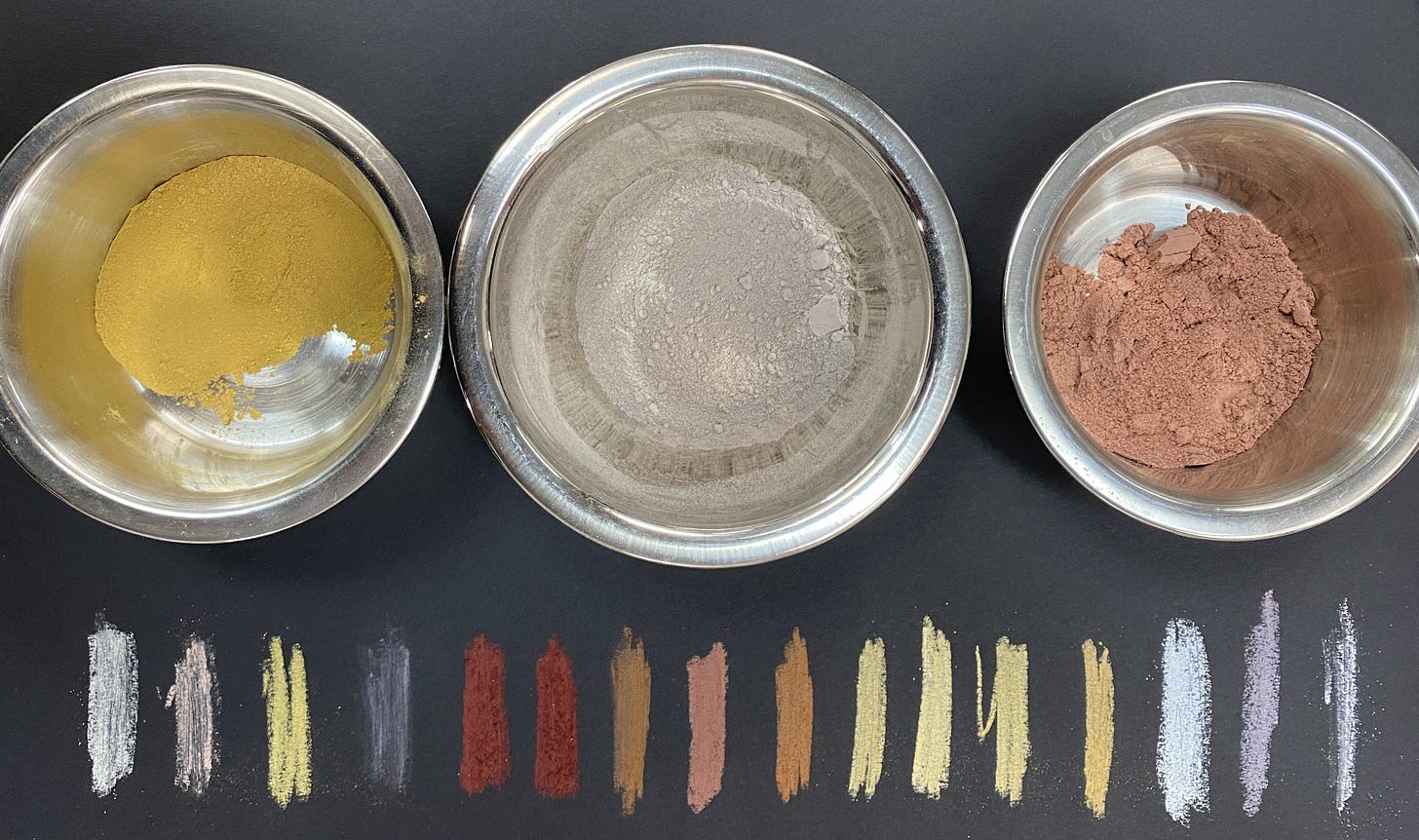
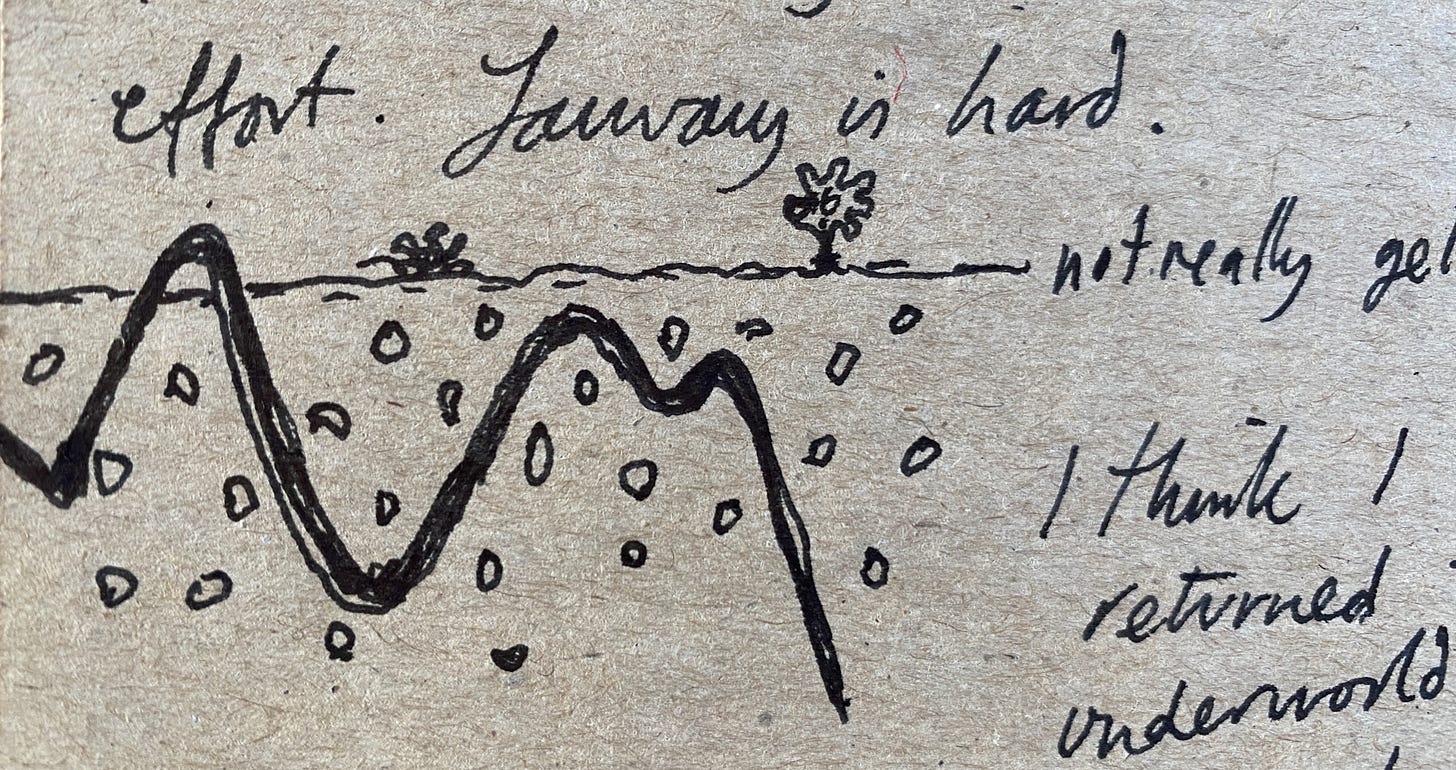
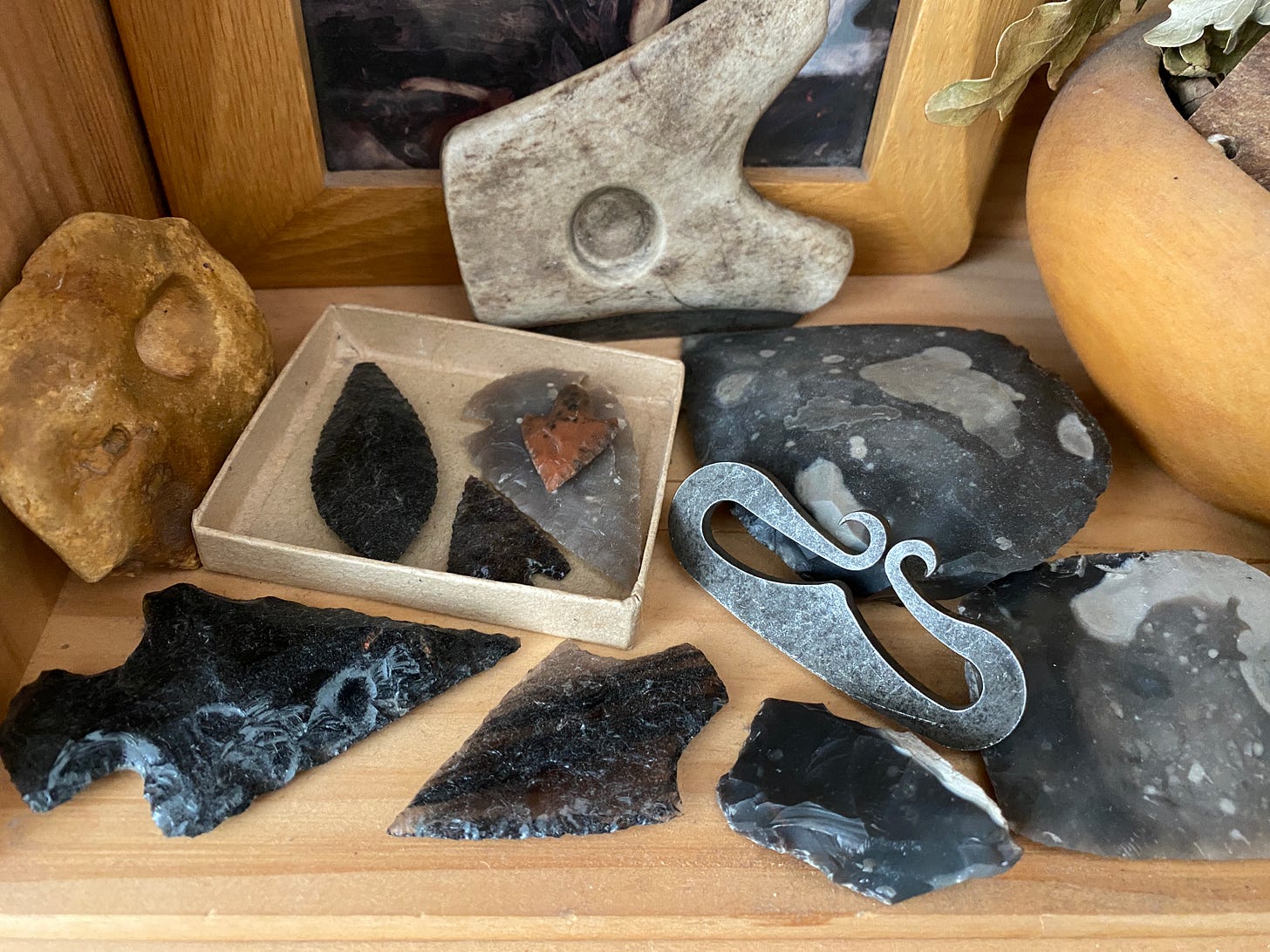
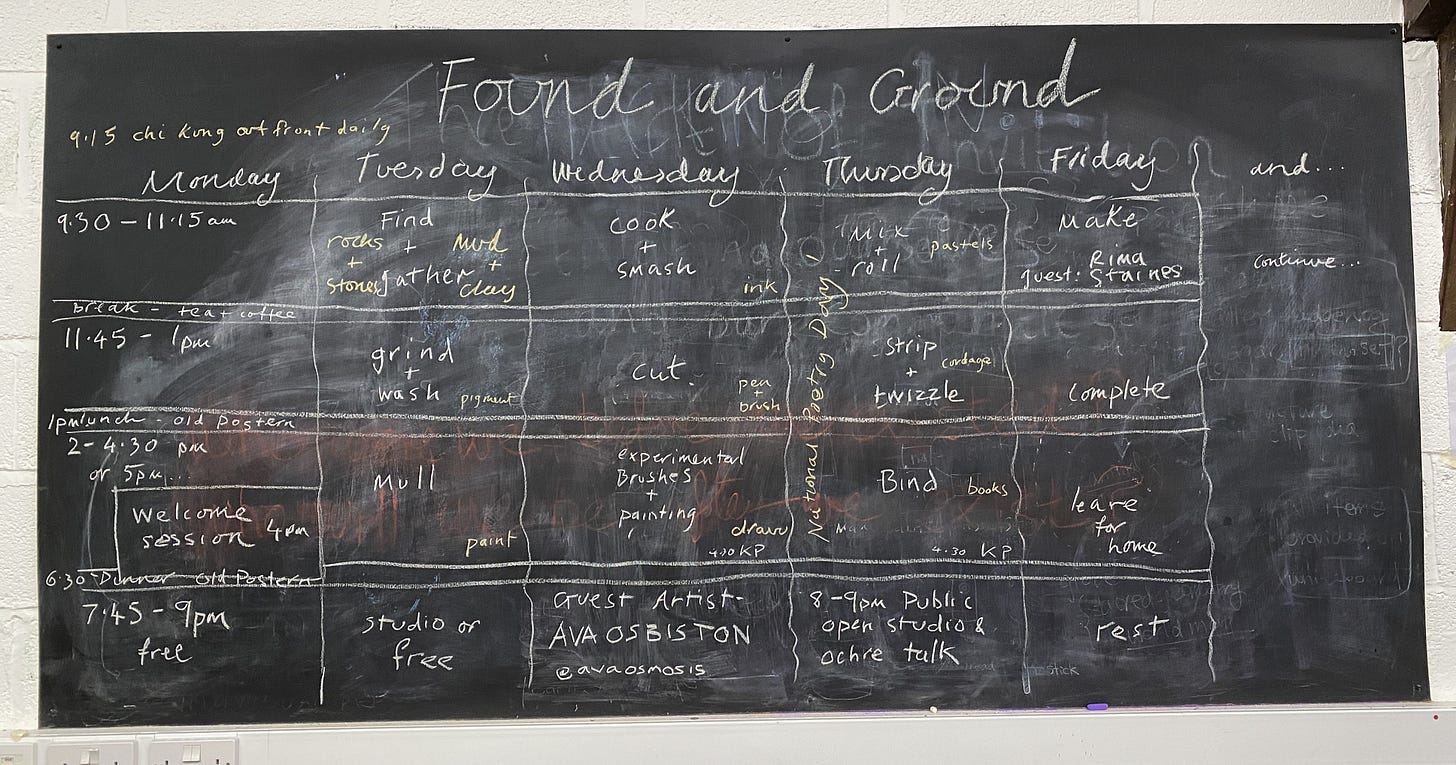
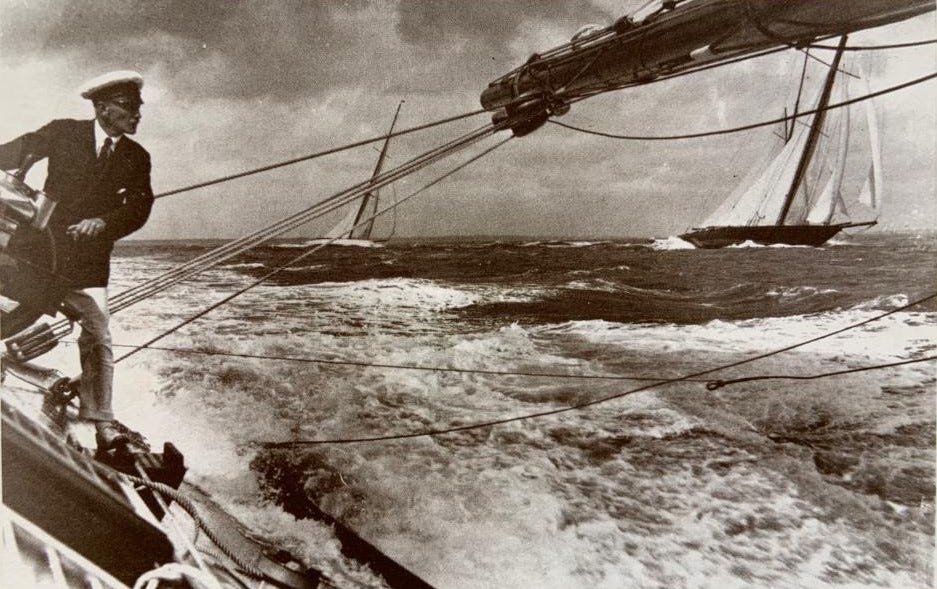

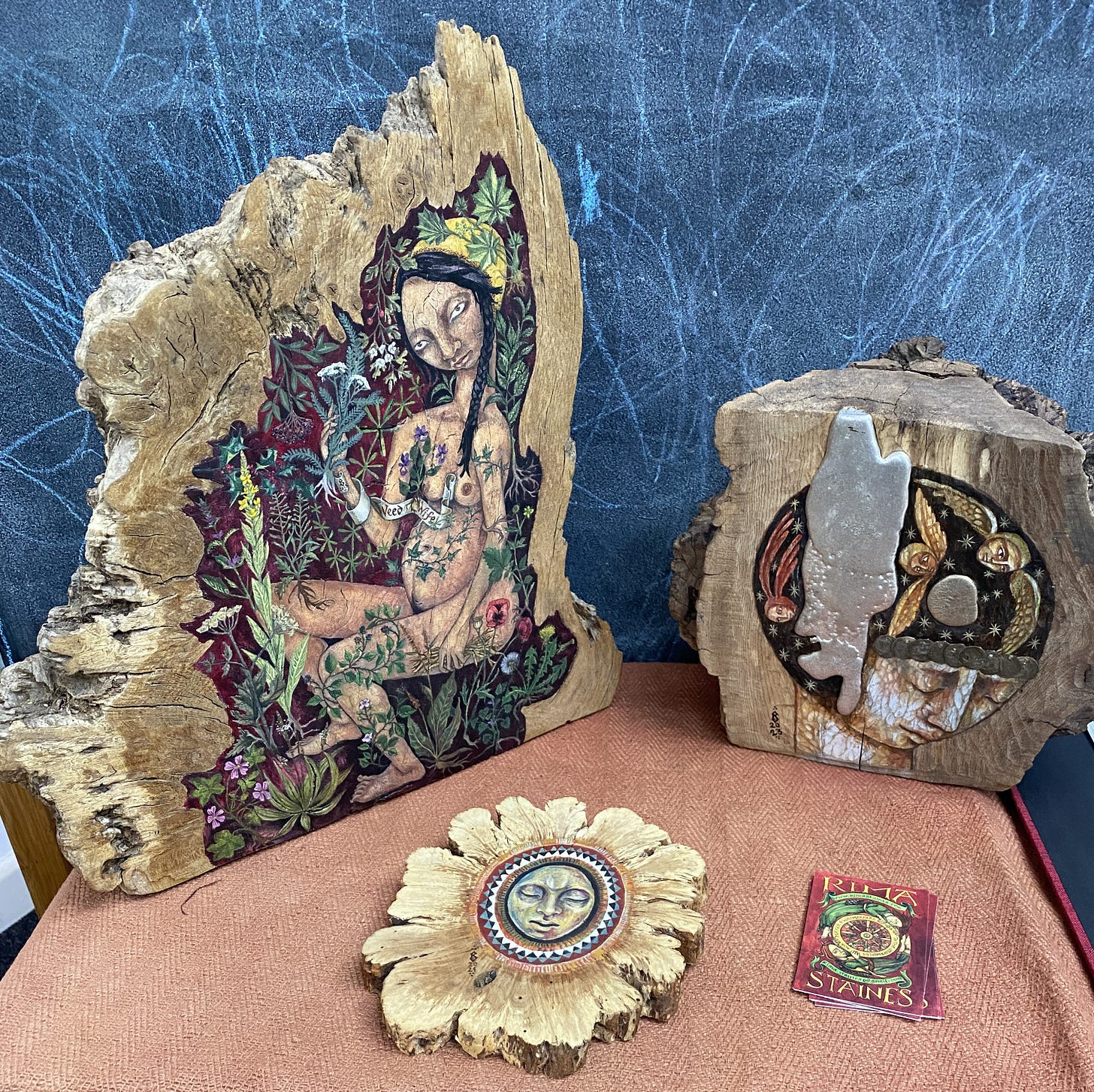
this one is my favourite - well said
This is a magnificent piece of writing my friend, and one I dearly needed to read right now. That is such good news that you will be working with Rima too! I wish so much I could attend that course.